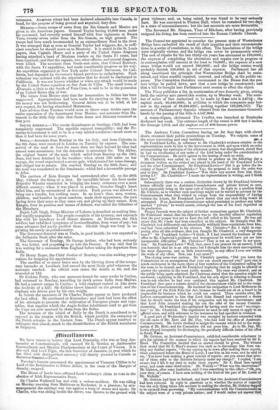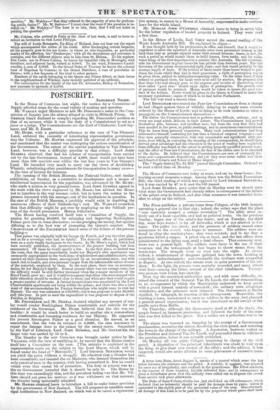Itlistellantous.
We have reason to believe that Lord Ponsonby, who was so long Am- bassador at Constantinople, will succeed Sir R. Gordon as Ambassador Extraordinary and Minister Plenipotentiary at the Court of Vienna. It is also said that Lord Elgin, the late Governor of Jamaica, (a post which he has filled with distinguished success,) will shortly proceed to Canada as Governor-General.—Tinzes.
Tuesday's Gazette announced the appointment of Viscount Clifden to be Lord of the Bedchamber to Prince Albert, in the room of the Marquis of Granby, resigned.
The House of Lords have affirmed Lord Carberry's claim to vote in the election of Irish Representative Peers.
Sir Charles Wetherell has met with a serious accident. He was riding on Monday morning from Maidstone to Rochester, in a phaeton; by mis- management the carriage was run against a heap of stones and upset: Sir Charles, who was sitting beside the driver, was thrown to the ground with great violence; and, on being raised, he was found to be very seriously hurt. He was conveyed to Preston Hall, where he remained for two days in a state of unconsciousness; but the last accounts are more favourable. '
The Reverend Mr. Simpson, Vicar of Mitcham, after having previously resigned his living, has been received into the Roman Catholic Church.
The Committee appointed to consider the present state of Westminster Bridge have embodied the result of their inquiries and their recommenda- tions in a series of resolutions, to this effect. The foundations of the bridge were originally vicious, and the bridge can never be permanently sound. The cost of repairs for the last thirty-six years has amounted to 190,0001; the expense of completing the alterations and repairs now in progress or in contemplation will amount at the least to 70,0001.; the expense of a new stone bridge would not exceed 360,0001.; and the bridge estates would probably furnish 100,0001 in aid of that expense. Parliament has all along sanctioned the principle that Westminster Bridge shall be main- tained, and when needful repaired, restored, and rebuilt, at the public ex- pense. The Committee therefore recommend to the House that the pre- sent bridge be pulled down, and that a new bridge be constructed; and that a bill be brought into Parliament next session to effect the object.
The Times publishes a list, in continuation of two formerly given, setting forth the railway acts passed this session, up to Monday week. The num- ber of miles of line authorized to be made by these acts is 3,672k; the capital stock, 90,540,9381, in addition to which the companies may bor. row to the extent of 38,688,829E, making together 129,229,7671. The amount of Parliamentary deposits released from the Accountant-Genentre hands by the passing of the bills is 4,147,3041 A steam-frigate, christened The Conflict, was launched at Pembroke dockyard last week. The extreme length of the vessel is 209 feet 5 inches, the tonnage 1,013, and the engines are of 400-horses power.
The Andover Union Committee having sat for four days with dosed doors, resumed their public proceedings on Tuesday. We subjoin some of
the more interesting and raoy incidents. Ow It
Sir Frankland Lewis, in reference to Mr. Chadwiek's evidence relative to the representations made by him to the Government in 1838, and upon which an order recommending the extension of the allowance system was disapproved, stated that he had no recollection of any order of the kind being under the consideration of the Commissioners. He never agreed to the issuing of such an order. Mr. Chadwick was called in; he offered to produce on the following day a document written on the subject and placed in the hand of Sir Frankland Lewis and the other Commissioners. Sir Frankland Lewis—" Did it go before the Se- cretary of State?" Mr. Chadwick—" Yes; the proposal to issue the order was sent to him." Sir Frankland Lewis—" Was there any answer from him dual. lowing it ? " Mr. Chadwick—" I made the representation in writing, and I think there was."
Subsequently there was a curious distinction drawn by Sir Frankland between letters officially sent to Assistant-Commissioners and private letters; so sent, both apparently being on the same sort of business. In reply to a question from Mr. Christie, as to whether such markings might not be turned to account by the Commissioners when they wished to escape from the responsibility of having written the letters, Sir Frankland Lewis denied that any such thing would be attempted. If an Assistant-Commissioner asked permission to produce any letter marked "private," he would assent, although the loss of his head depended on its production.
Pauper funerals were the subject of further accusations against Mr. Chadwick. Sir Frankland stated, that his objection was to the horribly offensive regulation that the poor pauper was not to have the bell tolled at his funeral. He was not aware that Mr. Coode had been consulted on the subject. He thought that Mr. Chadwick had deliberately and intentionally withheld those regulations from him, and had them submitted in his absence. Mr. Christie—"Am I right in sup- posing after all this evidence, that you thought Mr. Chadwick a very dangerous man?" Sir Frankland Lewis—"I think, if I had trusted the business of the office to Mr. Chadwick's guidance and management he would have got me into innumerable difficulties." Mr. Christie—" That is not an answer to my ques- tion." Sir Frankland Lewis "Well, then, since I am pressed for an answer, I tell you honestly, that he is an able man; but I thought him the most unscrupulous, the most dangerous, and as little trustworthy, as any officer I ever saw within the walls of any office. Now, can I say more?" The closing scene was curious. Mr. Christie's question, "Did you leave the Commission on an arrangement that your son should succeed you?" gave rise to much excitement in the room; three or four members of the Committee calling for the room to be cleared, and Sir Frankland imploring that he might be allowed to answer the question in the most public manner. The room was cleared; and on the public being again admitted, the Chairman stated that the question might be answered; explaining to Sir Frankland, that his only object in referring to his son was to ask whether -'he had ever cautioned him against Mr. Chadwick. Sir Frankland then gave a minute detail of the circumstances which led to the resig- tion of his Commissionership. He tendered his resignation to Lord Melbourne on the passing of the Irish Poor-law Act, because he would not sit at a board to be responsible for business which he could not control. Three months after, Mr. Lefevre communicated to him that Lord John Russell had expressed a desire that he should make the time of his resignation suit his own convenience; and that Lord John intended making his son the offer of the vacant Commis' - sionership. Sir Frankland also apologized for having used the word " unscrupu- lous " to Mr. Chadwick. The expressions he used he only meant to apply in an ofroial sense, and with reference to the instances he had specified in evidence.
A good part of Wednesday's inquiry was occupied by matters connected with the old cases of Mr. Mott and Mr. Day, who had held the office of Assistant- Commissioners. Mr. Lewis declined to assign the reasons which led to the resig- nation of Mr. Mott; and the Committee did not press him. As to Mr. Day, Mr. Lewis alleged incapacity for discharging the peculiarly difficult duties of his office in South Wales.
Mr. Gulston, an Assistant-Commissioner, exhibited considerable reluctance to give his opinion of the manner in which his reports had been received by Sir E. Head. The Committee decided that an answer should be given. The witness then stated that Sir E. Head's manner was such as to discourage him from ma- king any further reports. "On my coming up to town after making those reports, when summoned Wore the House of Lords, I saw him in his room, and he said to me, 'You have been making a great number of reports: are you aware that seve- ral of them refer to the districts formerly under my charge?' I replied, I ant aware; but I felt it my duty to make those reports.' Sir E. Head then turned away, and made some observation." Mr. Wakley—" What was the observation?" Mr. Gulston, after some hesitation, said it was something to this effect—"Oh„yes, your duty, of course. I have seen nothing of the kind on the part of Mr. Lewis or Mr. Nicholls."
Mr. Gulston had been to Ireland, and knew that two Assistant-Commissioners had been reduced. In reply to questions as to whether the matter of capacity was the only thing taken into account in making the election, Mr. Gulston begged to be excused from answering. "My communications with the Commissioners on the subject were of a very private nature; and 1 would rather not answer that
question." Mr. Wakley—" But they referred to the capacity of men for perform- Mg, public duties?" Mr. M. Sutton—" I must clear the room if the question is in- sisted on." Mr. Wakley—" The hour is so late, then, that I will not insist on patting the question."
Mr. Cobden, who arrived in Paris at the close of last week, is said to have re. ceived an invitation to visit Louis Philippe.
The will of Louis Bonaparte, Ex-King of Holland, does not bear out the report which accompanied the notice of his death. After discharging certain bequests, all his property goes to his son Louis; to whom he also bequeaths, as particular marks of his affection, his" Dunkerque," with all the decorations and souvenirs it contains, and the different objects sent to him from St. Helena. To his nephew, Don Louis, son to Prince Canino, he leaves his beautiful villa de Montughi, with furniture, and adjacent lands, valued at 8,000/. To his ward, Francesco Castel- vecchio, a sum of 6,0001. To the Grand Duke of Tuscany he leaves the colossal bust of Napoleon by Canova; to the Grand Dutchess, a vase of porcelaine de Sevres; with a few bequests of the kind to other persons.
Numbers of the cattle belonging to the Queen and Prince Albert, at their farms in the neighbourhood of Windsor, have recently perished of an epidemic. The subscription for the family of the late Dr. Alexander, Bishop of Jerusalem, now.amounts to upwards of 3,5001.



























 Previous page
Previous page